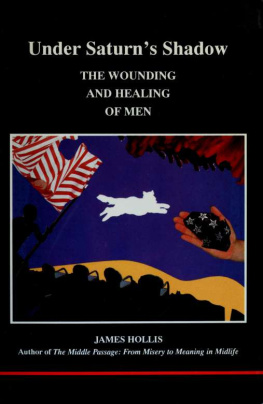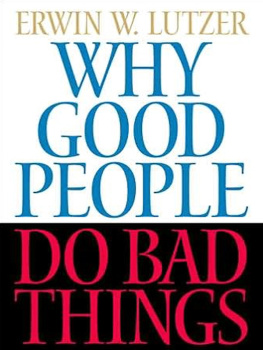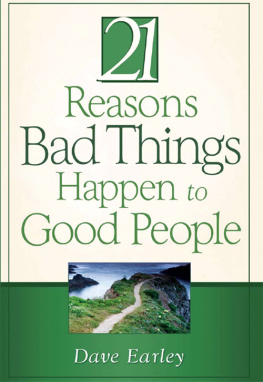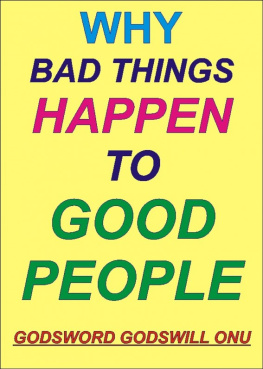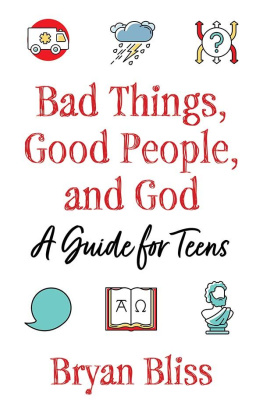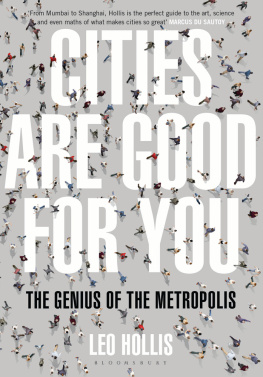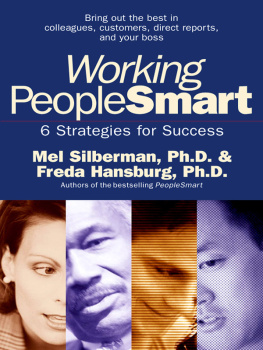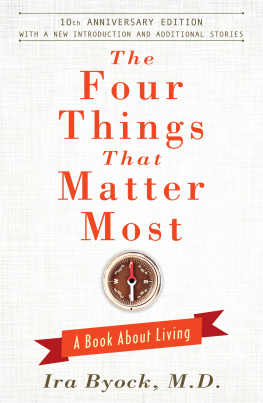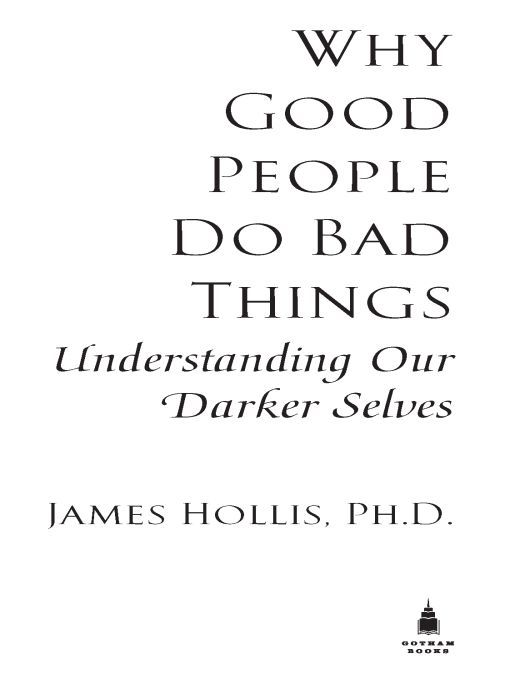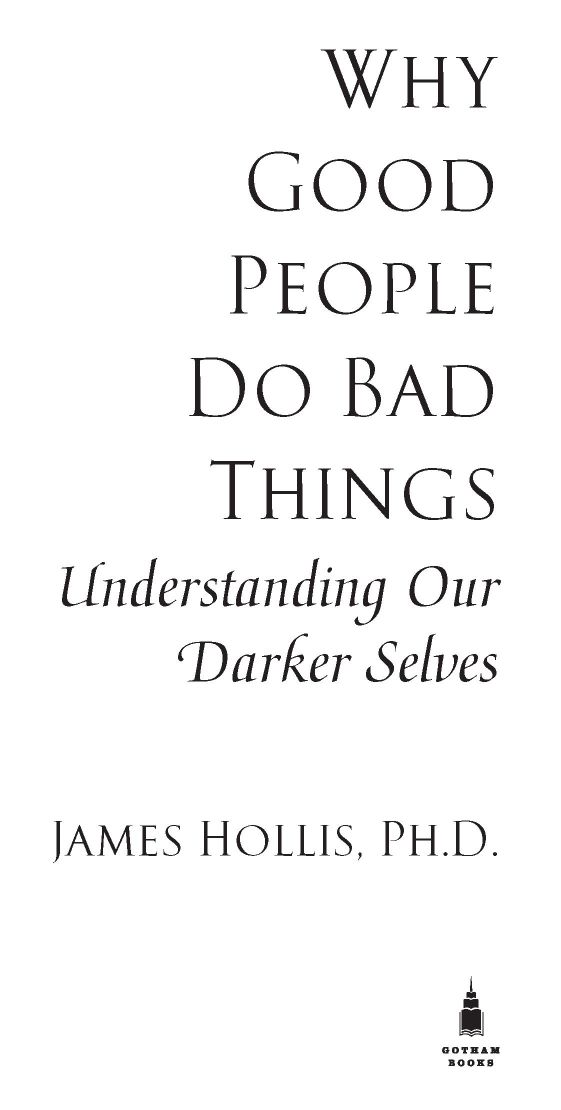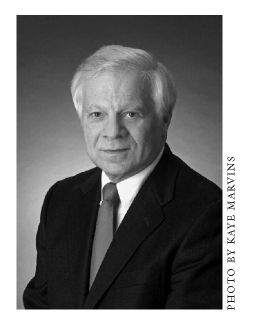Table of Contents
Praise for James Hollis:
Nourishing... Like a master chef, James Hollis knows that good food for the soul cannot be ordered to go.
The Plain Dealer (Cleveland)
Everyone seems to be obsessing about the monetary cost of the graying of the American population, but theres very little talk of the soul. James Hollis... has plenty to say about the soul.... Erudite and cultured but also accessible. Portland Tribune
Hollis speaks to and teaches from the heart. A combination of genuine vision and genuine humanity is a rare and valuable gift.
Clarissa Pinkola Ests, author of Women Who Run with the Wolves
James Hollis is the most lucid thinker I know about the complexities and complexes that interfere with living a full life.... Hes one of our great teachers and healers.
Stephen Dunn, Pulitzer Prize-winning poet
Praise for James Holliss
Finding Meaning in the Second Half of Life:
Offers insight into the process of finding true meaning later in life.... Challenging... earnest. Houston Chronicle
[A] deep Jungian exploration of individuation.... humane and compassionate.... [Holliss] focus on the underlying meaning of life will resonate for many. Publishers Weekly
A work of soul-making. It brings solace and wisdom to those of us who find ourselves in a dark wood, in the second half of life.
Edward Hirsch, author of How to Read a Poem and Fall in Love with Poetry
Midlife is a time when people can lose their way and flounder. James Hollis knows this terrain, describes it well, and asks the important questions that can lead to clarity, maturity, and meaning.
Jean Shinoda Bolen, M.D., author of Goddesses in Everywoman and Gods in Everyman
James Hollis, Ph.D., received a B.A. from Manchester College and a Ph.D. from Drew University. He taught humanities for twenty-six years in various colleges and universities before becoming a Jungian analyst at the Jung Institute in Zurich, Switzerland, where he received a diploma in analytical psychology. He lives in Houston, Texas, with his wife, where he has a private analytic practice and is executive director of the Jung Educational Center of Houston.
For Jill,
And our four children,
Taryn, Tim, Jonah, Seah
And for Rob who wanted to see his name in this book
And the people of the
Jung Center of Houston, Texas
My special thanks go to Gotham Books/Penguin,
with whom I am pleased to be associated:
William Shinker, President and Publisher
Lauren Marino, Executive Editor
Hilary Terrell, Assistant Editor
Sarah Reidy, Publicist
And to Liz Williams,
amie et agent provocateur et extraordinaire
NOTA BENE:
While based on the stories of real people, all names included herein are fictitious, with genders and professions changed and locales mixed. All dreams are accurately cited and are used with express permission of the dreamers, whom I thank. References to C. G. Jungs Collected Works are abbreviated in the text as CW, with the volume and paragraph number following.
PREFACE
Each person is a world, peopled by blind creatures in dim revolt against the I, the king, who rules them.
GUNNAR EKELF
The I that I know does not know enough to know that it does not know enough. It thinks itself luminescent crystal, when it is mostly grays, mostly vague, oblique shapes, and sometimes stark, opaque obsidian. Who I think I am is only the ego talking, a fragile wafer cast upon an immense inner sea. Our language betrays us. When I say I, which I is speaking? Which part of the whole is, for the moment, dominant? When I say myself, which self is speaking? How can I say I know myself, in every... or any moment?
How is it that good people do bad things? Why is our personal story, our societal history so bloody, so repetitive, so injurious to self and others, so self-defeating? This book operates from a central thesis that is relatively unknown to the general public but is a truism for depth psychology, namely, that the human psyche is not a single, unitary, or unified thing, as the ego wants to believe. It is diverse, multiplicitous, and divided... always divided.
It is the delusion of the ego, sometimes a necessary delusion, that this aggregate of splinter selves is under our control, contained within the purview of consciousness, or even knowable at all. These splinter selves, these darker presences, are fractal energy systems, and therefore have the capacity to act independently of our conscious intention. In fact, they are quite active, at almost all moments, and have the power to overthrow consciousness, usurp freedom, and enact their own programs, whether we know it or not. If we look at this idea humorously, we would have to say that certain parts of ourselves have never been introduced to the other parts, and if they had, they might not get along very well.
This autonomous world within is the realm of what Jung called the Shadow. It is not evil, as such, although it may do things that we or others later judge evil. In the end we are wholly accountable for the actions and consequences of the Shadow, even if we were unconscious of its enactments at the time.
The activities of these darker selves, these shadowy force fields, show up in more than our personal lives. They show up in our social systems, in our politics, in our interpersonal relationships, and even in our theologies. Why would it not be the case that the infinite complexities of the human psyche will manifest in the infinite complexities of the world we have created, or the world as we have imagined? It is rumored that the secret of the universe was once imparted by Hermes Trismegistus (Thrice-Greatest) in ancient Egypt. That secret, revealed here at no extra cost to the reader, is that things above are copies of things below, and things below copies of things above and the way up and the way down are the same.
Thus, a sincere exploration of the complexities of our daily lives will require us to bear witness to the variegated human psyche, as well. Explorations of the individual human psyche will necessarily uncover its activities everywhere in groups, and even in its images of the universe. Many in our time do not bother to examine from whence their daily lives are generated; many do not consider the relationship between the individual psyche and the social and political enmeshments we have spun; many do not consider how our own psyche construes and even transplants its image onto the cosmos. In examining this subject, we must therefore sort through how our complex, multiform human psyche plays out at so many levelspersonal, societal, cosmic. The organization of this book, its sequential logic, is to start with the personal and immediate, and then move out in widening circles from the personal to the social, then to the historic, then to the cosmic, and back again to the very personal, for it is at least partially from the personal Shadow that all these other planes of our reality derive. In the end, our work with our personal Shadow largely defines our engagement with the Shadow at all the other levels. What we have ignored within ourselves will sooner or later arrive from outside... like a truck headed toward us in the wrong lane.







